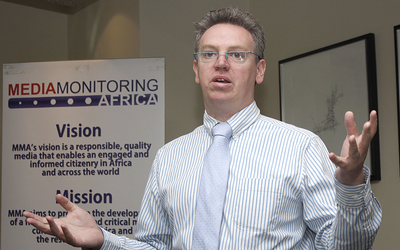CORRUPTION has for the first time in the history of South Africa’s democracy dominated the mainstream media’s election campaign coverage, Media Monitoring Africa director William Bird said on Monday.
The media think-tank’s research about media coverage of elections in the past seven weeks of campaigning found corruption was not only a major topic, but that much of it related to security upgrades to President Jacob Zuma’s private home at Nkandla, in KwaZulu-Natal.
Many predicted that the project would damage the African National Congress’s (ANC’s) image and performance ahead of Wednesday’s polls, and would lead to a significant decrease in its support.
Mr Bird said nearly a 10th of campaign coverage pertained to corruption in the government. Other dominant topics were party campaigns, party politics, protests and messages on social media platforms.
"Corruption never appeared as a dominant topic in election coverage before. The only reason corruption featured in election coverage now is because it surrounds Nkandla, Mr Bird said.
"While party politics is important to know about these things, they do not help the voter to make any specific decision."
Media coverage of the campaign trail ahead of elections had been fair and diverse, but politicians’ hubris, remarks and party politics had overshadowed issues such as the economy, jobs and service delivery.
Media Monitoring Africa’s research found that campaign advertising was also a dominant topic in election coverage.
In recent weeks the Democratic Alliance (DA) and the Economic Freedom Fighters (EFF) have filed complaints with the Independent Communications Authority of South Africa’s Complaints and Compliance Commission that the South African Broadcasting Corporation (SABC) would not flight their television campaign advertisements.
The DA’s Ayisafani advertisement was initially banned by the SABC, which also refused to flight an EFF advertisement in which the party pledged to "destroy e-tolls physically" if elected.
The SABC said its decisions were based on concerns about the incitement of violence.
Mr Bird said voter education, crime, land, housing, poverty and other important issues constituted only 8% of mainstream media election coverage.
"It’s good that we are 20 years on. From a media that was largely bias(ed), we moved to an era where the majority of our media coverage is fair. And yet you still get a number of clown politicians saying things that lack substance and don’t really constitute news as we understand it."
The election is expected to be the most challenging yet for the ANC, as opposition parties use grand promises, and the scandals linked to Mr Zuma against the governing party.
Media Monitoring Africa found that the ANC, the DA and the EFF had dominated the media space during the election campaign.
The parties, which are expected to become the three largest in terms of electoral support after Wednesday’s elections, had a combined 77% of media coverage.
Agang SA and the Congress of the People each received 4%.
Smaller parties shared the remaining 15%.
The head of journalism at the University of the Witwatersrand, Anton Harber, said investigative journalism had put corruption under the spotlight. "Through that, the media has put corruption in focus and made it central to the agenda.
"It’s also largely driven by the fact that opposition parties have seen that as a weak point of ANC leadership and have driven that home," Mr Harber said.
The ANC had been trying to drive a narrative about "20 years of delivery" in its campaign, but coverage indicated that it had not succeeded in driving out the opposition-led narrative around corruption.
Mr Bird said the research showed Mr Zuma was the individual with the most coverage of any in the election campaign trail at 6%.
He was followed closely by DA leader Helen Zille and EFF leader Julius Malema at 4% each.
The research shows that Public Protector Thuli Madonsela, former intelligence minister Ronnie Kasrils and Independent Electoral Commission spokeswoman Kate Bapela received more media space than leaders of smaller political parties.

Media Monitoring Africa director William Bird. Picture: PUXLEY MAKGATHO
CORRUPTION has for the first time in the history of South Africa’s democracy dominated the mainstream media’s election campaign coverage, Media Monitoring Africa director William Bird said on Monday.
The media think-tank’s research about media coverage of elections in the past seven weeks of campaigning found corruption was not only a major topic, but that much of it related to security upgrades to President Jacob Zuma’s private home at Nkandla, in KwaZulu-Natal.
Many predicted that the project would damage the African National Congress’s (ANC’s) image and performance ahead of Wednesday’s polls, and would lead to a significant decrease in its support.
Mr Bird said nearly a 10th of campaign coverage pertained to corruption in the government. Other dominant topics were party campaigns, party politics, protests and messages on social media platforms.
"Corruption never appeared as a dominant topic in election coverage before. The only reason corruption featured in election coverage now is because it surrounds Nkandla, Mr Bird said.
"While party politics is important to know about these things, they do not help the voter to make any specific decision."
Media coverage of the campaign trail ahead of elections had been fair and diverse, but politicians’ hubris, remarks and party politics had overshadowed issues such as the economy, jobs and service delivery.
Media Monitoring Africa’s research found that campaign advertising was also a dominant topic in election coverage.
In recent weeks the Democratic Alliance (DA) and the Economic Freedom Fighters (EFF) have filed complaints with the Independent Communications Authority of South Africa’s Complaints and Compliance Commission that the South African Broadcasting Corporation (SABC) would not flight their television campaign advertisements.
The DA’s Ayisafani advertisement was initially banned by the SABC, which also refused to flight an EFF advertisement in which the party pledged to "destroy e-tolls physically" if elected.
The SABC said its decisions were based on concerns about the incitement of violence.
Mr Bird said voter education, crime, land, housing, poverty and other important issues constituted only 8% of mainstream media election coverage.
"It’s good that we are 20 years on. From a media that was largely bias(ed), we moved to an era where the majority of our media coverage is fair. And yet you still get a number of clown politicians saying things that lack substance and don’t really constitute news as we understand it."
The election is expected to be the most challenging yet for the ANC, as opposition parties use grand promises, and the scandals linked to Mr Zuma against the governing party.
Media Monitoring Africa found that the ANC, the DA and the EFF had dominated the media space during the election campaign.
The parties, which are expected to become the three largest in terms of electoral support after Wednesday’s elections, had a combined 77% of media coverage.
Agang SA and the Congress of the People each received 4%.
Smaller parties shared the remaining 15%.
The head of journalism at the University of the Witwatersrand, Anton Harber, said investigative journalism had put corruption under the spotlight. "Through that, the media has put corruption in focus and made it central to the agenda.
"It’s also largely driven by the fact that opposition parties have seen that as a weak point of ANC leadership and have driven that home," Mr Harber said.
The ANC had been trying to drive a narrative about "20 years of delivery" in its campaign, but coverage indicated that it had not succeeded in driving out the opposition-led narrative around corruption.
Mr Bird said the research showed Mr Zuma was the individual with the most coverage of any in the election campaign trail at 6%.
He was followed closely by DA leader Helen Zille and EFF leader Julius Malema at 4% each.
The research shows that Public Protector Thuli Madonsela, former intelligence minister Ronnie Kasrils and Independent Electoral Commission spokeswoman Kate Bapela received more media space than leaders of smaller political parties.














 News, views and analysis of South Africa's national and provincial elections on May 7 2014
News, views and analysis of South Africa's national and provincial elections on May 7 2014






Change: -0.47%
Change: -0.57%
Change: -1.76%
Change: -0.34%
Change: 0.02%
Data supplied by Profile Data
Change: -1.49%
Change: -0.25%
Change: -0.47%
Change: 0.00%
Change: -0.39%
Data supplied by Profile Data
Change: 1.28%
Change: 1.67%
Change: 1.23%
Change: 0.88%
Change: 1.17%
Data supplied by Profile Data
Change: 0.11%
Change: -0.73%
Change: -0.07%
Change: -0.52%
Change: -0.32%
Data supplied by Profile Data